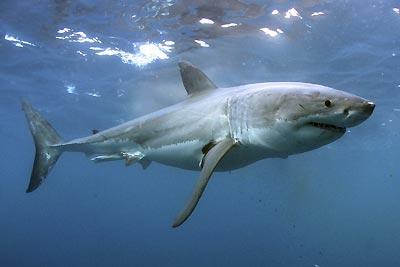In Search of Great White Sharks in the Far North
Presentation by Dr Clinton Duffy
7pm Friday 23rd January
Houhora Big Fish and Sports Club
Seeing a great white shark next to the boat is close enough for most of us, but how about hauling it up onto the boat to tag it? For Dr Clinton Duffy, DOC marine scientist and great white shark expert, it's all in a days work.
Over the past three years Clinton has been traversing the New Zealand coastline in search of one of the ocean's most feared and effective predators as part of a joint NIWA, DOC, Shark Tracker/NABU project.
Next month Clinton will be heading to the Far North hoping to tag some great white sharks off this coastline.
"We tag the sharks with a popup archival satellite tag (PAT tag) which can be programmed to pop-up anywhere from a few days to 18 months. For this project we usually programme them for 6-9 months" said Mr Duffy.
Data on light levels, temperature and depth experienced by the shark are then transmitted to an ARGOS satellite, which emails the data back to the scientists.
"We are then able to determine the route the shark took, how deep it dived and the temperatures it experienced" said Clinton.
"Previously tagged sharks have dived as deep as 1000 metres and been found as far away as Tonga, New Caledonia and Great Barrier Reef".
The research has already debunked the image of great whites as cold water coastal sharks, as scientists now know that many make trans-oceanic migrations to tropical waters.
"The reason for the winter tropical holiday is still unknown, but we think they may be searching for humpback whale calves because many of the tags have surfaced in or near known humpback calving sites" said Dr Duffy.
Great white sharks are declining world wide. According to international shark expert, Dr Ramon Bonfil, the ocean's most ferocious predator is undoubtedly a victim of the planets most deadly species - humans.
Trophy hunting, shark control programmes, accidental capture in gill nets and vulnerability to over-fishing are all contributors to this fearsome and awe-inspiring marine creature's demise.
As a prelude to his Far North work, Clinton will be doing a presentation for anyone interested in finding out more about great white sharks. The evening promises to add a different perspective on the ‘Jaws creature of terror' image that still plagues this vulnerable fish. The presentation will be held at the Houhora Big Fish and Sports Club on Friday the 23rd of January at 7pm.
For more information contact Irene Petrove at the Department of Conservation in Kaitaia, 09 408 6014.



Comments